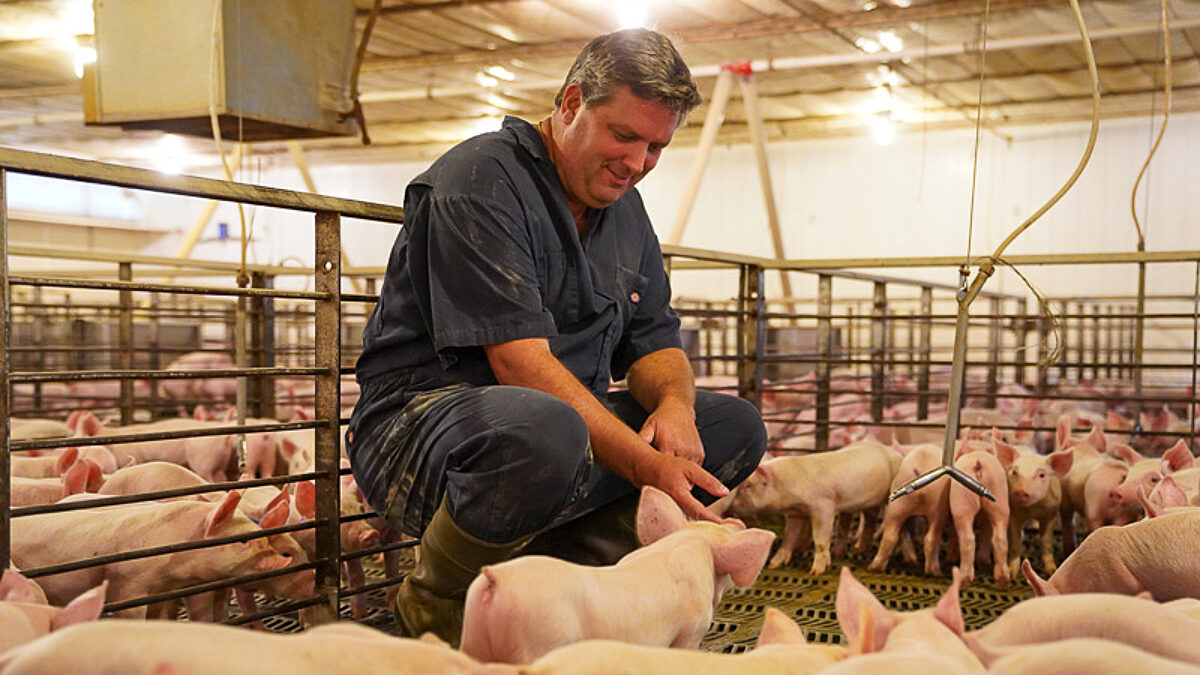Farmers Care for Animals and the Environment
Cyndie Shearing
Director, Communications

photo credit: Pennsylvania Farm Bureau, Used with Permission
Cyndie Shearing
Director, Communications
Chris Hoffman is president of Pennsylvania Farm Bureau. He is a first-generation hog and chicken farmer. This is the fourth in a series of “Question & Answer”-style columns with state Farm Bureau presidents on current issues in agriculture.
Q. Why do you raise hogs and chickens in barns?
A. Chris Hoffman: There are multiple reasons why we raise animals inside. Number one, it’s better for the health and safety of our animals. We can control their nutritional intake, we are able to monitor and often control the temperature. We are also able to recycle animal waste by collecting it for use as fertilizer. By using science and technology we are able to optimize the health of our livestock while also undertaking environmentally smart practices.
Biosecurity is also a good reason to house animals indoors. We can protect them from diseases and parasites that they could be challenged with if they were outside, especially with chickens and pigs. Both can be vulnerable to diseases from birds and other wildlife.
Q. How do you ensure your animals are comfortable and healthy?
A. Chris Hoffman: As a farmer over the years, you get to understand how your animals respond and act, as well as their mannerisms which will show you whether or not they are comfortable and content. We also know through research what conditions are optimal for most animals and birds based on their age and size. Farmers pay attention to the details and that’s how we really optimize the environment that our animals live in.
Q. How do you manage the manure from the farm animals in your care?
A. Chris Hoffman: All of the collected manure goes into pits, under the barn or in outside lagoons. Each of our manure pits has a different nutrient makeup. There is a fascinating amount of science behind it all, which helps us develop a nutrient management plan. This guides us to make sure we apply the proper nutrients to the crops we are trying to grow to maximize their health and yield. In other words, we know what nutrients the crops need so we tailor the manure that’s applied to meet those needs. It’s a win-win. We reuse our manure through a careful process to get the healthiest crops.
We want to make sure that when we are spreading manure it stays in the soil and doesn’t run off. I live within the Chesapeake Bay Watershed, so making sure that manure does not end up in the streams is extremely important to me. We use a lot of natural vegetative buffers and other strategies to protect the water supply on our farm and make sure that manure doesn’t end up in streams. I’m proud of our contributions to protecting the Chesapeake Bay Watershed and the regional progress toward that goal.
Something so obvious to us as farmers isn’t always obvious to those who have little exposure to agriculture. In my mind, that’s an opportunity.
Q. How have advancements in technology changed day-to-day operations on your farm?
A. Chris Hoffman: In the last 35 years, we have seen a tremendous amount of technology become available to us on the farm. We have been able to use new controls that help us monitor every part of the atmosphere that our pigs live in. We make sure the humidity level is optimal, the temperature is perfect, and we’re also using technology to reduce water usage. I’ll add that we’ve also reduced energy usage by using new LED technology to reduce costs.
Q. How does your commitment to the health and safety of your family and neighbors impact the choices you make on your farm?
A. Chris Hoffman: Our commitment to our community is the same as the commitment to our family. We want to make sure that we keep the water clean and that we use the right technologies to keep the soil healthy. We use every tool in our toolbox to protect health and safety as we continue to produce food for our neighbors.
Q. As policy discussions continue about improving Americans’ health, what role do you see for farmers?
A. Chris Hoffman: I think that we have to make sure we tell the story of what we are doing on a day-to-day basis to produce healthy food and contribute to healthy outcomes in America. We owe it to our communities and the public to explain how we use science and technology to improve health and safety and why it’s so important to continue to have access to these tools. I sometimes hear others talk about what farmers do with emotion, but without a full understanding of how farms operate. It is up to us, as farmers, to make sure that we are having conversations about our farming practices, our commitment and why we do what we do. I’m sometimes surprised when people I talk to are reassured to learn that what we feed our neighbors is also what we are feeding our families. Something so obvious to us as farmers isn’t always obvious to those who have little exposure to agriculture. In my mind, that’s an opportunity.
P.S. From my farm to your table, please enjoy a great pulled pork sandwich this Fourth of July!
Top Issues
VIEW ALL